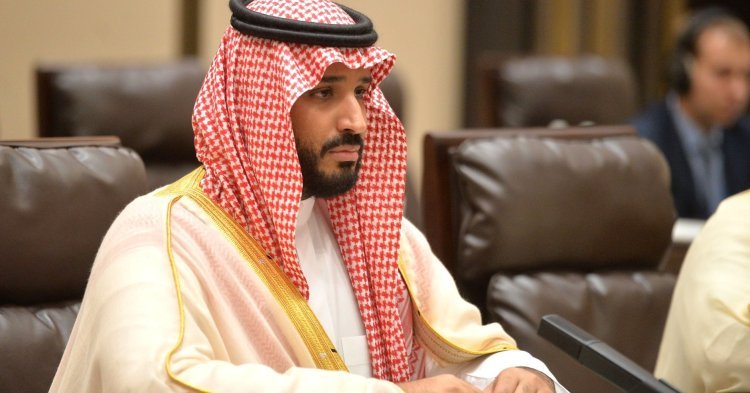The EU’s reticence will no doubt be welcome in the kingdom, which has endured a media firestorm since it summarily ejected the Canadian ambassador eight days ago. The Saudi government has also suspended new trade with Canada, cancelled flights to Toronto and pulled its 15,000 students out of Canadian universities, in response to Canadian Foreign Affairs Minister Chrystia Freeland’s tweet demanding the release of jailed Saudi activist Samar Badawi and her brother Raif. Although Canada has said it is willing to engage in dialogue to break the impasse, the Saudis have yet to extend their own olive branch.
To be fair, the EU has demanded clarification from Saudi Arabia on the arrests of female dissidents, but this doesn’t go nearly far enough for rights groups and critics of the Saudi regime. They say this latest outburst is a further indictment of new Saudi Crown Prince Mohammed bin Salman, or MBS, who has pushed a number of reforms since he was appointed last year but also ramped up the repression of political dissenters. Women may have gained the right to drive on MBS’s watch, but female activists have also been arrested in droves. Observers explain this contradiction by suggesting that while Saudi Arabia’s de facto ruler is happy to make minimal reforms to mollify critics, he wants to demonstrate that such measures are taken on his terms. If Western companies want to take Saudi money, they need to hold their noses – and their tongues. Freeland’s tweet, sent by a female representative of a feminist government, provided the perfect opportunity to make this point.
Hawkish policy
Observers also say the kingdom’s outburst at Canada points to a worrying desire to stamp its authority on the world stage. The incident comes little more than a year after Riyadh led a blockade of neighbouring Qatar, a policy which will become even more hostile if Riyadh’s plans to build a canal turning Qatar into an island go ahead. The boycott has hardly been a roaring success – in fact Qatar’s economy has withstood the blockade, handing Saudi Arabia a rather embarrassing setback.
Yet despite, or perhaps because of, this failure, MBS has maintained his aggressive international line, continuing the war in Yemen and (allegedly) taking the Lebanese prime minister hostage. Having recently been thwarted in his attempts to back an Israeli-Palestinian peace plan by his own father, King Salman, the crown prince has happily used the Canada kerfuffle to reaffirm his nationalist agenda (and excite his vocal band of supporters on social media).
Given the volatility of Bin Salman and the kingdom, it’s hardly surprising that Europe has stayed silent on his latest power play. After all, MBS has shown he has no problem punishing European critics, recently announcing the exclusion of German firms from Saudi government tenders after a long-running dispute which, reminiscent of the Canadian impasse, was sparked by comments from Germany’s foreign minister. Several European countries, notably France and the UK, have spoken out in defence of the Saudis over recent months: perhaps they’ve decided it’s not worth putting a €55 billion trading relationship at risk.
Yet if the EU were to take a collective stand over the Canada spat, their collective security would provide a daunting bulwark against any reprisals. After all, Saudi Arabia would have a far more limited scope of action against the bloc than it has against Canada; for one thing, they wouldn’t be able to recall their students from the EU since they lack bilateral agreements with individual member states.
Economic ties
In other words, if MBS were to respond to condemnation from the EU, that would mean taking on the entire bloc – and jeopardising a trading bond which is just as significant to Riyadh as it is to Brussels. It’s relatively easy to cut Canada adrift when bilateral trade is worth less than $4 billion a year, but the EU accounts for over 10% of Saudi Arabia’s total exports and provides a crucial source of arms imports. Saudi ministers have embarked on a charm offensive among Europe’s major states over recent months, signing off a £65 million package of investments in the UK and announcing new trade ties with France, suggesting they are anxious to keep relations warm.
In fact, recent economic trends suggest MBS would be keener than ever to maintain cordial ties with Europe right now. The Crown Prince has placed foreign capital at the heart of his ‘Vision 2030’ diversification strategy, a roadmap to reduce dependence on oil revenues, and pushed an ambitious privatisation programme headlined by the planned listing of oil giant Saudi Aramco. Yet foreign investment plummeted to a 14-year-low last year, with FDI inflows from Europe falling [particularly-https://www.middleeastmonitor.com/20180323-foreign-investment-in-saudi-arabia-lowest-in-a-decade/] sharply. A prolonged oil price slump may be the primary cause, but critics suggest the political instability caused by the bombardment of Yemen, coupled with MBS’s recent arrest of several princes and business leaders in what he called a corruption crackdown, hasn’t helped matters. If the crown prince wants to win back foreign investors, he can do without picking any more fights.
Of course, the Saudi government could still use oil, its trump card, to take a minor swipe at Europe – such as by raising bureaucratic costs, though likely not by withholding supplies completely. Yet it seems the potential rewards from taking a stand against a belligerent foreign power, in favour of human rights, would outweigh the risks of reprisal. MBS’s economic agenda means he can ill afford a political dispute with Europe, so EU leaders have the perfect opportunity to speak out against his ill-judged posturing.

Follow the comments: |
|
